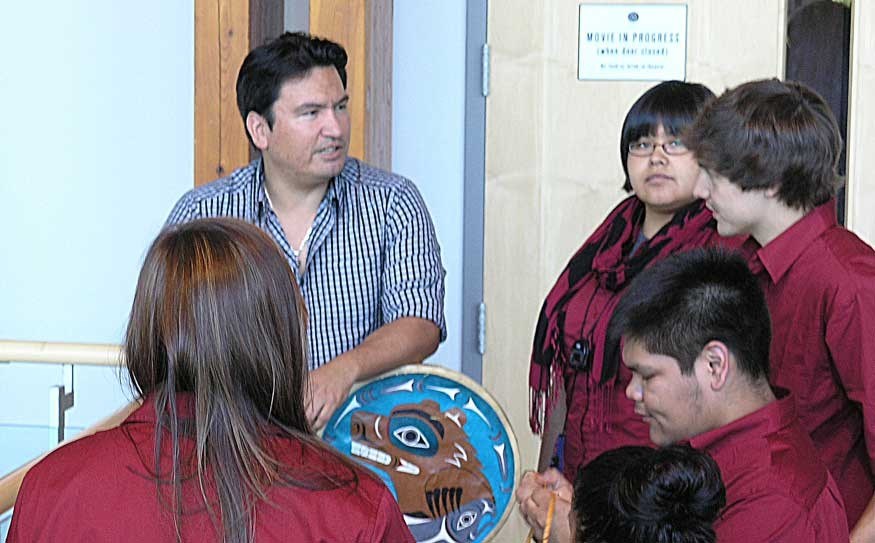Chief Ian Campbell of Squamish Nation chats with staff and trainees at the Squamish Lil'wat Cultural Centre in Whistler on Tuesday, July 24, 2012. Chief Campbell was on-site at the Centre to assist with cultural training and words of support for the cultural ambassadors who deliver the guest experience. (SLCC Photo/Allison Burns)
Squamish and Lil'wat First Nations have now added their two cents to Whistler's Official Community Plan (OCP) with a statement that could be worth its weight in gold in the future.
Embedded into Whistler's draft OCP, the overarching policy document guiding land use and development in the resort — as required by the provincial government — is a new statement that reads:
"There are no First Nations Reserve lands within the RMOW (Resort Municipality of Whistler) boundary but there are substantial Crown lands within the municipal boundary and in adjacent rural areas which could play a role in settlements of aboriginal rights and title claims."
It's a strong message that Whistler is in traditional territory of the Squamish and Lil'wat Nations and that they have unresolved claims to aboriginal rights and title.
Without it, Squamish and Lil'wat were not prepared to support Whistler's document, blocking its approval in the final days of the last council's term.
The wording is a welcome move for Squamish Nation Chief Ian Campbell.
"It was crucial because the two nations do have land interests, not only with aboriginal rights and title, but with fee simple lands, and we don't want those lands to be excluded and be sterilized by planning processes that don't consider our interests and would potentially have an impact on... the ability to develop," he said.
But it doesn't end there.
The plan also identifies specific First Nations' interests such as:
• Working with Whistler and the province to further develop relationships and to explore opportunities to work together on economic and tourism related initiatives.
• Planning sustainable First Nation developments on existing and future First Nation private lands within the RMOW boundaries.
• Working with Whistler and the province to develop OCP policies to protect First Nation archaeological, heritage and other cultural interests.
"I think that it took it a step further than recognition — to look at economic opportunities as well," said Campbell.
Campbell, who was at the Squamish Lil'wat Cultural Centre this week working with First Nations ambassadors, said it's a positive step forward.
"We're very happy that RMOW has continued to engage with both Squamish and Lil'wat," he said.
"It's always best to not leave it up to the courts to decide and it's best to probably come face-to-face as good neighbours, and have candid discussions on what opportunities are there to create win-wins and certainly to provide our young people the opportunity to flourish equally as any other person in the region.
"Rather than being alienated from our own land and resources," he added, "we find mechanisms to find agreements to open doors.
"For the most part we've been more or less invisible in our own lands, so this was another step in that aspiration to strengthen relations in the face of colonization of our territory."
At the July 17 marathon council workshop meeting on the draft OCP, council members had a lot to say about the nitty-gritty details of the document but were relatively quiet about the new First Nations input.
"It's been reviewed by our solicitors?" asked Mayor Nancy Wilhelm-Morden of staff.
"Yes," replied both CAO Mike Furey and Mike Kirkegaard, manager of resort planning.
Municipal staff will be submitting a First Nations consultation record to the Ministry of Community, Sport and Cultural Development. Ministerial approval is needed before the municipality can adopt the OCP.
The final draft plan is expected to be ready by Aug. 21.




